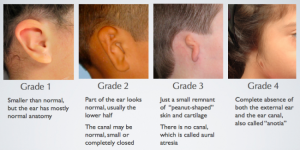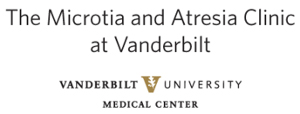Sometimes, children are born without one or both ears due to a congenital birth defect, known as Microtia. Hearing loss can also be associated due to underdeveloped or absent ear canals, known as Aural Atresia. In addition to Microtia and Atresia, some children may also be born with facial challenges, where one side of the jaw bone is shorter than the other due to craniofacial microsomia or hemifacial microsomia, causing a crooked smile. Children and adults who are born with Microtia and Atresia can live perfectly happy and healthy lives and can be anything they would like to be in life such as doctors, teachers, scientists, artists… even musicians just like the legendary rocker, Paul Stanley of KISS.
Living with Microtia and Atresia is not always easy though. There can be some challenges that come along with missing ears or little ears. Aside from the public stares that can hurt feelings and cause low self esteem issues and the curiosity behind questions which can come across as hurtful sometimes when asking about little ears, some children and adults with Microtia and Atresia quickly realize that life isn’t always easy trying to fit in. For some, they may struggle with their hearing due to hearing loss. It helps to be educated about your options regarding hearing loss and the different options of hearing devices or hearing loss repair surgery (Atresia repair) that can potentially help someone who has Microtia and Atresia hear better. Some individuals may choose to wear a hearing device because they notice how much of a difference it makes for them each day rather than continuing to struggle with their hearing loss and some individuals may not choose a hearing device because they are used to hearing through one ear and have gotten very good at finding helpful ways of positioning themselves closer to say a presenter near the front of the room or table, by reading lips or by learning to be more visually aware in their everyday environment. Some children and adults struggle to wear something as simple as eyeglasses because they may sit crooked on the face because one ear is missing. In fact, eyeglasses and sunglasses can’t be worn at all if both ears are absent. In addition to the struggle with eyeglasses and public stares, reconstructive surgery can be a great option to help someone living with Microtia and Atresia feel whole and be happier in life. Therefore, it is always important to know what surgical options are available if someone born with Microtia and Atresia is ever interested in having surgery for reconstructing an ear or choosing a prosthetic ear. It never hurts to educate yourself and learn as much as you can regarding what options are available that can maybe help you be your happiest.
One of the best options for someone living with Microtia and Atresia is to love and accept yourself as you are. Not everyone believes in surgery sometimes. To find that good circle of friends, have confidence in who you are (even if you are missing an ear or two) and try and be happy with yourself should always be at the top of the list. There are many people in our world who are missing something or have some kind of challenge the are struggling with. They do not let this define them. Love yourself and remember that not only are many people missing a finger or a leg or an arm or a hand, but they have still found a way to have a career and live the life they want. I am always impressed with the children and adults who are missing limbs and thanks to prosthetic arms and legs and feet, they can run and walk. So, sometimes while a challenge we may have may seem so devastating, it could always be worse. We are still very lucky because children and adults who have Microtia and Atresia are not only beautiful and perfect in every way, but so many love music and dancing and are making the best of their lives.
Last week, the Ear Community Organization’s Founder, Melissa Tumblin, was interviewed by a friend (Jen Allen) who wanted to help get the word out about what Ear Community is doing to help give back to the Microtia and Atresia community and to give Melissa a chance to share her family’s story and why she founded Ear Community nearly ten years ago to help other children and adults just like her daughter, Ally. Here is a great interview with Melissa sharing her experience and telling how her daughter, Ally, and Ear Community have helped so many with Microtia and Atresia.
_______________________________________________________________________
On Tuesday, April 23rd, legendary rocker, musician, and artist Paul Stanley “the Star Child” of the rock band KISS, spoke about his life with Microtia and Atresia in an interview with Dan Rather at 8/7c on AXS TV. Paul Stanley was born with Microtia and Atresia of his right ear just like my daughter, Ally. A few years ago, he also released a book that he wrote where he talks about his challenges and successes with Microtia and Atresia. An inspirational book about life and how to overcome personal struggles. So many of our children and adults who were born with Microtia and Atresia can be ROCK STARS in life just like Paul Stanley.
Thank you!
Everyone at the Ear Community Organization
www.EarCommunity.org
Here is interview clip and the article and Paul’s commentary from this interview:
https://www.facebook.com/theDanRather/videos/415313519253164/UzpfSTI0MDg1NzgwNzE1OjEwMTYxNzA3NjAwMDM1NzE2/
KISS’ Paul Stanley Reveals a Physical Deformity Pushed Him to Pursue Stardom
“I had what’s called a microtia, which is basically not having an ear,” Stanley told Dan Rather on The Big Interview
KISS frontman Paul Stanley is opening up about why a birth defect pushed him to chase stardom.
During a sit-down with Dan Rather on The Big Interview, Stanley, 67, says he pursued fame “as a way to compensate for a lot of insecurities.”
“I was born deaf on my right side and I had a birth defect. I had what’s called microtia, which is basically not having an ear. Having a crumpled mass of cartilage.”
According to the Center for Disease Control, microtia “happens when the external ear (the part of the ear that can be seen) is missing completely.”
Because of this Stanley says “I wasn’t very socially adept.”
“When you have something physical that sets you apart from people it makes you really a target of unrelenting scrutiny and sometimes ridicule. And, quite honestly, the idea of becoming famous was a way to push it in people’s faces and go, ‘You see, you should have been nicer to me,’” Stanley told Rather.
Although Stanley, aka Star Child, and the members of KISS grew to become legendary figures in music after forming the rock band in 1973 — he realized success wasn’t the answer to his problems.
“I was fortunate enough to have success come to me and realize that didn’t change anything. So I was really blessed because, at that point in your life, it’s either a disappointment because it’s not a remedy and you either put a needle in your arm, a gun in your mouth or you live your life as a victim, and I’m not cut out for that,” Stanley explained.
“So, I decided that I would spend my life and my time on self-exploration and trying to make myself a better person and seeing where that was going to take me.”
“I was blessed to be a part of an idea to become the band we never saw and that led me on a course that I’m still on today — where it’s taking me God only knows,” Stanley said.
Stanley previously spoke of the years of bullying he endured because of his condition in his autobiography Face the Music: A Life Exposed.
Stanley echoed his sentiments in his conversation with Rather, saying “songs and groupies” didn’t change his insecurities.
“I couldn’t have written the book if it didn’t have a happy ending,” Stanley wrote. “The point really is, we can hide our secrets but we can never hide them from ourselves, and the only way to find happiness is to let go of those secrets.”
Back in 1982, Stanley underwent reconstructive surgery by Dr. Frederick Rueckert of New Hampshire, according to his memoir, Variety reported.
Rueckert removed pieces of cartilage from Stanley’s rib cage and formed them into an ear. The surgeon died in May 2017.
“My dear friend Dr. Frederick Rueckert has died at 95. He truly changed my life when he constructed my right ear from my rib. God bless you,” Stanley wrote on Twitter following Rueckert’s death.
After 45 years in the business, Stanley and KISS members Gene Simmons, Tommy Thayer and Eric Singer announced their farewell tour — End of the Road.
“All that we have built and all that we have conquered over the past four decades could never have happened without the millions of people worldwide who’ve filled clubs, arenas and stadiums over those years,” KISS said in September.
RELATED: Paul Stanley of KISS Welcomes Fourth Child
“This will be the ultimate celebration for those who’ve seen us and a last chance for those who haven’t.”
The tour officially kicked off on Jan. 31 in Vancouver.
In total, KISS has released 20 studio albums, eight live albums, and 13 compilation albums plus over 60 singles.
The band has been noted as America’s #1 Gold Record Award-winning group of all time, according to the band’s website. KISS was also inducted into the Rock & Roll Hall of Fame in 2014.
Stanley’s appearance on The Big Interview aired on April 23, 2019.
Thank you!
Everyone at the Ear Community Organization
www.EarCommunity.org











Leave a Comment
You must be logged in to post a comment.